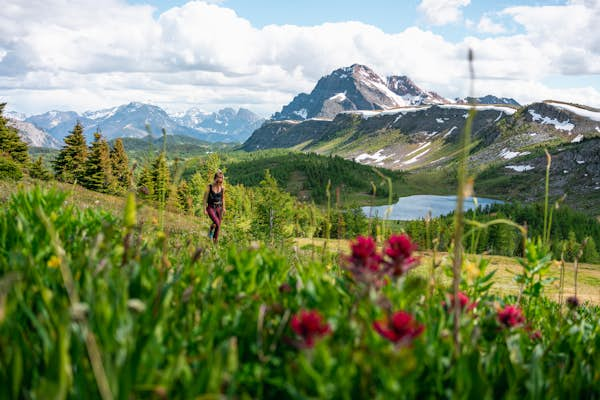
8 of Banff National Park’s best day hikes
With its reputation for delivering some of Canada’s most iconic scenes on a sweeping scale – think unbelievably blue lakes backed by majestic snow-capped peaks – it’s easy to see why Banff continues to reign as the country’s most-visited national park. More than four million people visit the park annually, yet it’s surprisingly easy to get away from the throngs of tourists, thanks to an extensive maintained system of 1600km (1000 miles) of hiking trails.
Some of the most popular tracks start directly from the Lake Louise and Banff townsites, with others easily accessible via the park’s shuttle and transit options. From short family-friendly outings to full-day adventures to challenge more experienced hikers, here are Banff’s best day hikes for every skill level.
1. Vista Lake
Best one-hour hike
1.4km (0.8 miles) one-way; 60 to 90 minutes; easy
Lake Louise doesn’t have a monopoly on stunning mountain lakes. You can see the blue-green Vista Lake straight from the parking lot, but it’s well worth the short and sweet downhill stroll to its shores. What goes down must come up, though. It’s about a 120-m (400-ft) climb back up to the parking lot, so make sure your water bottle is full.
Then again, if one hour doesn’t seem to be quite enough, continue down the trail another 3.6km (2.2 miles) and you’ll arrive at Arnica Lake. It’s a challenging but rewarding 580-m (1900-ft) climb along the Continental Divide through fields of alpine wildflowers (in the summer months) and golden larch trees (in the autumn).
Start/finish: This out-and-back hike can be accessed from the clearly signed Arnica Lake trailhead on Hwy 93, about 8km (5 miles) south of Castle Junction on the south side of the road. The parking lot is small, so it pays to arrive early, especially during the autumn larch season.
2. Sunshine Meadows
Best for families
10km (6 miles) of trails to choose from; 4 to 5 hours; easy to moderate
In the summer, Sunshine Village – one of Banff’s most popular ski resorts – transforms into Sunshine Meadows: a family-friendly hiking oasis with over 10km (6 miles) of trails to choose from.
This really is a choose-your-own-adventure destination, with the added bonus of a fun gondola ride up to the trailheads. (In other words, you can reach such great heights without actually having to hike up to them.) There are relatively flat options available for little ones, but the most popular trail crests the Continental Divide to a viewpoint at Rock Isle Lake.
Start/finish: Sunshine Village ski resort can be found 8km (5 miles) west of Banff on Hwy 1. A free shuttle operates daily from the Banff townsite, with no reservations necessary. However, to access hiking trails, you must pay for the gondola ($68 adults; $19 children) from early July to early September.

3. Bow Glacier Falls
Best half-day hike
4.6km (2.9 miles) one way; 3 hours round trip; moderate
The only thing more captivating than a Rocky Mountain alpine lake? A Rocky Mountain waterfall. There are countless breathtaking falls to stop at as you drive north of Banff towards Jasper on the Icefields Parkway (Hwy 93), but it’s worth it to get out of your car and hike to some of the best ones.
Bow Glacier Falls sits firmly on this list, which is why this half-day hike ranks highly as a favorite of locals and visitors alike. Created by the Wapata Icefield melting and later turning into the Bow River (the same river that later flows past the Fairmont Banff Springs), Bow Glacier Falls tumbles off a rugged rock face. This scenic but relatively easy trail (with just 155m or 508ft elevation gain) follows the edges of Bow Lake before arriving at the falls.
Start/finish: The trailhead can be found on Hwy 93, 36km (22 miles) north of the Lake Louise junction, about 400m (0.25 miles) down the Num-ti-jah Lodge access road.
4. Katherine Lake via Helen Lake
Best full-day hike
16.6km (10.5 miles) round trip; 7 to 8 hours; moderate to difficult
The hike to Helen Lake – widely considered one of the best day hikes along the Icefields Parkways – isn’t exactly a hidden secret. This stunning lake – about 6km (3.7 miles) down the trail on a moderate trail that includes a steady 455-m (1490-ft) elevation gain and some small creek crossings – is nestled in a valley, surrounded by a meadow of wildflowers and towering mountains.
But if you’ve got some extra gas in the tank, use it to follow the signposts further along the trail for views of the much larger Katherine Lake. Then again, more experienced hikers may prefer the scrambling route to the top of the 2993-m-tall (9820-ft-tall) Cirque Peak, which offers impressive views of the surrounding lakes and glaciers.
Start/finish: The parking lot for the trailhead can be found on Hwy 93, roughly 33km (20 miles) north of the Lake Louise Junction on the east side of the road across from the Crowfoot Glacier viewpoint. Arrive early, as the parking lot fills quickly.

5. Johnston Canyon
Best winter day hike
1.1km (0.7 miles) one-way to the Johnston Canyon Lower Falls or 2.7km (1.7 miles) one-way to the Johnston Canyon Upper Falls; 1 to 3 hours; easy
With its easy grade and suspended catwalks to both the lower and upper falls, Johnston Canyon is a popular walk year-round. But it’s in the winter (from December until March) that the gorge is transformed into a crystalline playground, with its frozen waterfalls and pillars of ice making it a favorite with ice climbers.
Not interested in scaling a wall of ice? The good news is that you don’t need to wield an ice-ax to experience the wintery wonderland. Strap on some ice cleats or crampons and grab some poles (both available for rental at outfitters in the town of Banff, including Snowtips Backtrax) or sign up for a guided tour with a local operator such as Discover Banff Tours.
Start/finish: There are two parking lots at the Johnston Canyon day-use area, found along Highway 1A, about a 25km (15.5 miles) west of Banff. Even during winter, the parking lots can fill up by midday, so plan your visit according.
6. Peyto Lake Viewpoint
Best accessible hike
0.6km (0.4 miles) one-way; 30 minutes round trip; easy
Want maximum payoff for the least amount of effort? We’ve got you. This 0.6-km (0.4-mile) walk takes you up to a viewing platform that looks out over the turquoise waters of Peyto Lake, with a barrier-free 0.3-km (0.2-mile) trail available from the upper parking lot, making this a great option for those with limited mobility or wheelchair users.
Still got some energy to burn? Continue along the short nature trail; 0.6-km (0.4-mile) loop that will take you through the surrounding forest.
Start/finish: The trailhead can be found on Hwy 93, about 40km (25 miles) north of the Lake Louise junction at the Peyto Lake parking lot.

7. Big Beehive
Best for photographers
5km (3.1 miles) one-way; 4 hours round trip, but budget extra time for tea at the Lake Agnes teahouse; moderate
As you walk along the north shore of Lake Louise and begin your climb up towards the Lake Agnes teahouse, you’ll probably find yourself wondering, “Wait, I thought Lonely Planet said we’d get away from the crowds?” Have patience and trust. The first 3.4km (2.1 miles) of this wide, well-maintained trail surely has to be one of Banff’s most highly trafficked, with more hikers lured the 385m (1260ft) uphill by the promise of fresh scones at the European-style teahouse, which has been serving hikers since 1905.
But once you pass the historic teahouse (open June to October) and behind Lake Agnes, the crowds thin out considerably. From here, it’s just 1.6km (1 mile) via a series of switchbacks up to the top of the Big Beehive. The payoff? Picture-perfect panoramic views of Lake Louise and the Fairmont Chateau Lake Louise below. It’s particularly stunning after snow but be aware that this trail is at risk of avalanches.
Start/finish: Upper Lake Louise parking lot is 4km (2.5 miles) from the village of Lake Louise. Parking is at a premium here (and isn’t free), so unless you’re setting out at 4am, it’s highly recommended that you pre-book a shuttle if visiting in June through September.
8. Burgess Shale and Stanley Glacier Fossil Hike
Best for amateur geologists
10km (6.2 miles) return with 385m (1260ft) elevation gain; 8 hours; moderate
This moderately difficult hike technically isn’t in Banff National Park, but if you’re a geology nerd or have dinosaur-loving kids, you won’t regret making the drive just over the Alberta-British Columbia border into Kootenay National Park.
The well-preserved fossils of the Burgess Shale – the site of a shallow sea around 508 million years ago, well before dinosaurs roamed – can be found here high in the mountains. After walking through forests of wildflowers, towering pines and rushing waterfalls, you’ll arrive in the Stanley Glacier basin, where there are trilobites, hyolithids, brachiopods, and sponges from the Eldon formation, which visitors are welcome to handle. Have no clue what exactly that means? Don’t worry; Parks Canada staff will explain all on a guided hike ($80; reservations must be made in advance).
Start/finish: The Stanley Glacier parking lot is 15km (9.3 miles) south of Castle Junction on Hwy 93 in Kootenay National Park.
Tips for hiking in Banff National Park
- Banff National Park is home to both black bears and grizzly bears. Always carry bear spray – and know how to use it – when hiking. Bear spray can be rented from outdoor outfitters in the Banff township, including at Snowtips Backtrax, with staff happy to explain its use.
- Make plenty of noise as you hike, but don’t bother with bear bells. The soothing tinkle is far too quiet to keep bears at bay. Instead, experts recommend using large bursts of sound to alert bears that you’re nearby. Try clapping or yelling “Hey bear!” as you come around blind corners or walk through brushy areas.
- Elk – which are frequently spotted in and around Banff – can be aggressive and attack without warning, particularly during the spring calving season and the fall mating season. Always keep a safe distance.
- Stay hydrated. The town of Banff sits around 1383m (4500ft) in elevation and if you’re hiking, there’s nowhere to go but up. If you’ve just arrived from closer to sea level, you may need a day or two to acclimatize before tackling the more difficult trails. (Calgary, which sits at an elevation of 1045m or 3428ft, is a great and often more affordable place to do this.)
- Planning a hike at Lake Louise? Expect the parking lot (which is paid) to fill up well before sunrise. If you’re not a super-early-bird, booking a shuttle in advance from the Lake Louise or Banff townsites is your best bet. Likewise, Moraine Lake is now only accessible by shuttle.
- Plan your trip for July through September. In June, high-mountain passes will still be impassable due to snow or may be muddy due to the thaw. Always check trail conditions with Parks Canada prior to heading out.
You May Also Like

3 Lakme Beauty Products Tiktok is Obsessed With
January 24, 2022
These Celebrities Are Bringing Back Skinny Brows
August 28, 2021
